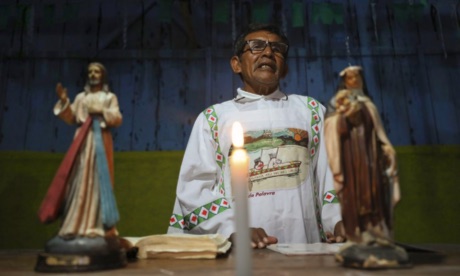At dusk in this small indigenous village, Antelmo Pereira calls local Catholics to prayer, changes into a white robe and leads a religious service that is the closest thing the faithful in this remote part of the Amazon can get to a proper Mass.
Speaking in the indigenous Ticuna language, he leads a recital of the Lord’s Prayer, reads a passage from the Gospel of Matthew and delivers a sermon on accepting Jesus into one’s heart, as cicadas chirp loudly in the jungle that lies just beyond the recently built Catholic church.
Pereira, 61, has been a part-time missionary for the past 15 years, volunteering his time on weekends to visit indigenous communities that rarely see a priest.
He leads prayer services called Celebrations of the Word but cannot celebrate Mass or hear confessions in the isolated places he visits, because he is married and has nine children, and cannot become a priest.
But that could change if a proposal to ordain married men in remote parts of the Amazon gains traction at a gathering of bishops that opens at the Vatican on Sunday.
More than 100 bishops from South America will convene at the Synod of Bishops for the Pan-Amazon Region.
The meeting will discuss social and environmental problems faced by the inhabitants of the Amazon, including the increasing rate of deforestation in the region.
But bishops are also looking at ways to introduce changes to official ministries to better serve Catholics in this part of the world.
One item on the synod’s agenda is a proposal to study the possibility of priestly ordination for older men who have good standing in their communities and are preferably of indigenous origin, “even if they have an established and stable family.”
While the synod proposal would be novel for the Latin Rite church, there are already married priests in Eastern Rite Catholic churches and in cases where married Anglican priests have converted.
Nevertheless, the proposal has set off a firestorm of criticism against Pope Francis, with opponents accusing synod organizers of heresy for even introducing debate on the centuries-old tradition of a celibate priesthood in the Latin Rite church.
For these critics, the Amazon synod is just the latest instance of Francis using the synod process to introduce progressive changes to the church by obtaining the blessing of a carefully chosen group of voting bishops.
On the ground, however, the agenda and focus on the needs of the indigenous have been welcomed.
“It’s a possibility that I haven’t quite processed in my head yet,” said Pereira, who is a member of the Ticuna tribe and would be a clear candidate for ordination if Pope Francis decides to pursue the reform.
“But if I am asked to become a priest I will accept. I will accept,” said the devout Catholic, who dreamed of becoming a priest as a youngster. Continue reading
Additional readingNews category: Analysis and Comment.




